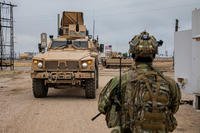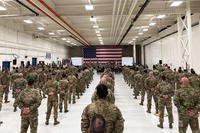Plan Ahead: Don't wait for a crisis to prepare for an emergency. Prior to deployment, discuss how to handle situations as they arrive: car trouble, home maintenance, financial matters, family emergencies. Discuss what constitutes an emergency and what funds are available to support possible costs. Collect and keep readily available all of the phone numbers for emergency assistance in your community. You will also need to have available the phone number for the point of contact in the rear detachment as well as the American Red Cross.
Emergencies: If an emergency does occur that requires contacting the servicemember, you will need to contact the unit's rear detachment immediately. In the event of a death or serious illness of a close family member, you will also need to contact the American Red Cross who will verify the emergency and contact the member's unit. Be prepared to share with the American Red Cross the full name of the family member, relationship, health care provider and/or hospital.
If an emergency occurs with the servicemember during mobilization or deployment, immediate family members will be notified via the military chain of command, the American Red Cross, or a unit chaplain. If you hear about an accident or illness through the grapevine, immediately check with one these sources and they will gladly verify the accuracy (or inaccuracy!) of the information.
Develop a Support System: Being married to a Reservist often means you are living far away from your family without the social or emotional support they offer. If possible, meet with other family members from the unit prior to and plan to meet throughout the period of family separation. Families will be able to lend emotional support to one another and provide assistance with children and emergencies. Don't wait for a crisis to determine who might be able to help you.

















